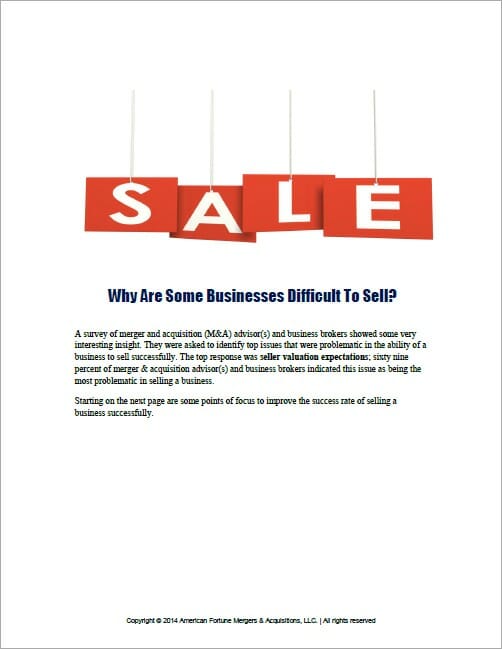How to Sell Your Business to the Best Buyer
Most business owners only need to buy or sell a business once in their lifetime. As with most things that people only do once, or possibly twice, the process often comes with unforeseen challenges and complications. Typically it means that both the buyer and the seller aren’t sure of what should happen or how to prepare for the next step. When that happens, there are professionals, business brokers to help the parties through the process.
Then there is a different matter; the possibility of a strategic, corporate, or equity buyer becoming involved in the sale. These buyers often have more than a fair share of experience buying businesses, which puts a seller at a disadvantage. For the seller, it means that the buyer has an express interest in your business, but they likely have a team of mergers & acquisitions advisers working on their behalf.
Sellers may find themselves in a lopsided negotiating arrangement – the amateur seller versus the professional buyer with a high-powered support team. This guide will help business owners selling a business protect themselves and set an even playing field, even when working with a corporate buyer.
Key Aspects to Consider Before Deciding to Sell a Business
When business owners handle the sale themselves in a Business for Sale by Owner (BFSBO) situation, they may come into the arena with a few preconceived notions. There are common issues that owners should assess or tackle right away.
First, selling a business is not like selling real estate. Your experience selling your home, will not lend much support here. Unlike selling a house, confidentiality is the top priority. A seller does not want to alarm employees, suppliers, or customers. When a business goes up for sale, it’s possible that clients could leave, employee performance may suffer, and suppliers can pull back from the company. You must go to great lengths to protect the confidentiality of your information and business. When potential buyers inquire about a business the seller should take caution. It’s always better to share too little information, rather than too much.
Second, the business cannot suffer through the process. Owners often unintentionally neglect a business while also trying to sell it for the best price possible. Selling a business demands time and energy, which is often time and energy you devote to running your business. You can work with your management team to build more autonomy. Ensure they can operate without you, so your time spent selling the business doesn’t harm the company.
Finally, you must know the real value of your company. Owners often misvalue their business because they rely on financial statements used for tax purposes or don’t account for value-driving factors that don’t appear in annual reports.
When you keep the sale confidential, ensure the company can operate well without your constant supervision, and obtain a thorough valuation, you can attract better buyers. As an owner, selling with or without a broker, you must understand the process and defend the asking price with confidence during negotiations.
Step One: Know the Business Sale Process
The business sale process is demanding, but it cannot distract the owner(s) from managing day-to-day operations. Sellers should plan approximately two or three years in advance and dedicate time to learning about the proper ways of selling a business. They must proficiently manage the sale and their company at the same time. Delegate tasks when necessary and assume that selling the business will easily consume 20% of your typical work week.
A business broker who handles these sales regularly can offer some relief for the amount of time spent on the selling process. They can also take off some of the stress that comes with selling a business. When an owner decided to sell their business, they should review the process and their current workload.
Consider these as beginning steps:
- Determine how and when you will begin maximizing profitability to boost company value.
- Identify when you will obtain a thorough valuation to set an asking price.
- Plan for a time frame to advertise or market the business as “for sale.”
- Assess how you can create time in your schedule for negotiations and vetting potential buyers.
Step Two: Value and Market the Business
Business owners don’t always have access to resources or understand the process of performing a full business valuation. It’s best to stay away from financial statements that you use for tax purposes as they purposefully seek to minimize the company’s value. Instead, focus your attention on completely transparent and accurate financial reporting as the jumping-off point for setting a company’s value.
A business valuation often involves many aspects that don’t appear on any financial documents within the company. Your businesses’ worth on paper doesn’t accurately represent the quality of staff, the intellectual property, and aspects such as customer loyalty. These factors are elements of the business that a potential buyer seeks to obtain through the transaction, it is only right to include them in the valuation.
After establishing a valuation and determining an asking price, you’ll need to begin marketing the business. This step is particularly troublesome as business owners may have trouble locating interested buyers on their own.
Establish a clear marketing plan that directly targets your ideal buyer. Then determine if you’ll have the best opportunity to reach them through confidential inquiries, online business for sale sites, industry-specific sites, or if you may need a broker.
Step Three: Vet Potential Buyers
Buyers often believe that they can simply secure funding when the time comes. This thinking brings up more problems for the seller than the buyer. When the buyer comes up dry, the deal falls through, and the seller has lost time, money, and potentially beneficial deals with other interested parties.
Sellers should ask early-on for proof of financing. They should make sure that they are comfortable with the buyer’s arrangements for securing financing. All acquirers should have no problem showing that they have the financial resources necessary to make the acquisition.
Sellers should ask potential buyers for their statements and a credit report. Unless the company is so large and successful that acquisition funds are not an issue, the buyer’s financial statements should be made available to the seller. Buyers who are financially capable of acquiring a business should not struggle to provide this information.
Step Four: Due Diligence
Due diligence will usually fall to the buyer’s business brokers. Sellers should do their due diligence too. You may have already worked to standardize your documentation, processes and ensure that your financial statements are clean and accurate. That is excellent, but what about due diligence regarding the potential buyer?
It’s essential to question many facets relating to the buyer before entrusting your company to someone. Does this person, or partnership, have experience in the industry? How many people purchase businesses specifically in retail, food service, or entertainment, only having experience as customers? Question what this person wants to accomplish with your company and how they will treat the staff and customers.
A seller should also review information about any prior purchases the buyer might have made. This would include previous financing contracts. Does this person have a history of buying businesses and helping them achieve greater success, or do they run them into the ground?
It may be possible to speak with a previous seller who can discuss how their deal went. Ask them how the acquirer was to work with and if they followed through on any promises. Talking to managers of previous acquisitions can also help sellers understand how this buyer treats employees and standard operations.
Step Five: Sell Your Business
The chemistry between the buyer and seller is important. Even owners selling independently to corporate buyers can cultivate positive chemistry during the sale process.
Consider these questions:
- Do you communicate well?
- Can you comfortably share information?
- Are questions openly asked and answered by both parties?
- Will the seller stay on with the company for a duration of time, and in doing so, are they comfortable working for the new owner and with a new management team?
The work put in during the negotiations and vetting process pays off in this step. You will finalize the transaction and, ultimately, move forward. What does that mean?
Business owners are often unprepared for what happens after they sell. Many sellers face an unexpected wave of grief and uncertainty, especially if they hadn’t worked out their plans for what to do after leaving the company. You can work against this with planning early on in the process.
A beneficial service of business brokers is the support for planning after the transaction. A specialist can help you plan how to take time for yourself during the sale and guide you in keeping busy afterward. For some people, this means exploring hobbies lost during their working years or even opening a new business venture. Working with professionals can help you identify and work out precisely what you want from the deal, handling the sale itself, and creating plans for what comes next.
To begin discussions with a business broker or mergers & acquisitions professional today, contact American Fortune. Learn about your role as an owner when you sell a business and more.
American Fortune Mergers & Acquisitions has taught clients how to sell a business in the following areas of the USA: Columbus Ohio, Atlanta Georgia, Lexington Kentucky, Bowling Green Kentucky, Nashville Tennessee, Memphis Tennessee, Cincinnati Ohio, Dayton Ohio, Toledo Ohio, Los Angeles, Cleveland Ohio, Pittsburgh Pennsylvania, Baltimore, Maryland, Indianapolis Indiana, Chicago Illinois, Detroit Michigan, Flint Michigan, Tampa Florida, St. Louis Missouri, Kansas City Kansas, Des Moines Iowa, Minneapolis Minnesota, Louisville Kentucky, Oklahoma City, Oklahoma, Dallas Texas, Fort Worth Texas, Denver Colorado, San Francisco California, Salt Lake City Utah, Phoenix Arizona, Lexington Kentucky, Los Angeles California, San Diego California.
Learn how to sell your business successfully with the help of American Fortune.






